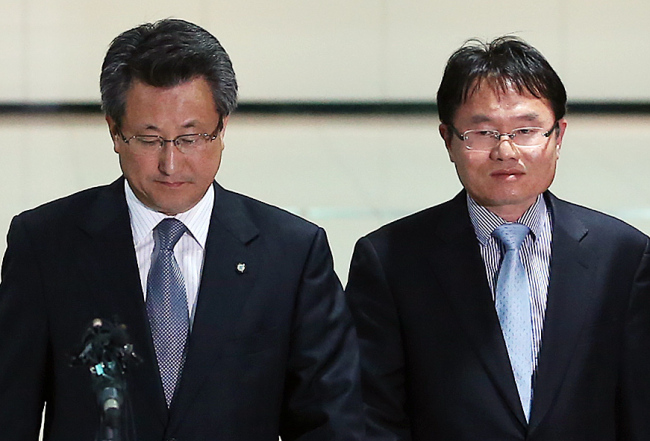
The last seven South Koreans who had negotiated the settlement of accounts on behalf of local businesses at an inter-Korean complex in North Korea returned home Friday, wrapping up a pullout from the zone amid high tensions on the peninsula.
The complete withdrawal of workers cast clouds over the fate of the Gaeseong Industrial Complex just north of the heavily fortified border, raising concerns over the possibility of permanent closure.
The complex remained the only remaining link between the two Koreas, whose relations have deteriorated to the lowest point in decades.
The Ministry of Unification said after all South Korean nationals crossed over the border, that understanding was reached on issues revolving around the payment of outstanding wages, the amount of taxes that South Korean companies owed Pyongyang and various service charges.
It said a total of US$13 million was paid that reflected demands made by the North, with the provision being added that called for adjustments after a more detailed tally is carried out at a later date. The sum includes $7.3 million owed by South Korean companies for wages that were not paid for March, $4 million for corporate taxes, and $1.7 million in various utility charges. South Korea sent two vehicles carrying cash to Gaeseong as part of the agreement, which returned over the demarcation line separating the two countries after the negotiating team. The money came from the state-managed inter-Korean cooperation fund, with Seoul to ask companies for reimbursement later on.
In addition, the ministry in charge of cross-border affairs said it asked the North to reopen both military and Red Cross hot lines that were cut earlier in the year to carry out further talks on the settlement that were not ironed out, such as the $1.2 million Pyongyang requested to account for wages its workers did not receive for the first eight days of April when they reported to work.
"We had moreover asked the North to return finished goods and manufacturing materials that were still at Gaeseong, but did not get a positive reply," said an official, who declined to be identified.
He said Seoul plans to continue raising this issue.
In regards to why Seoul accepted payment requests made by the North, the official said that the government's top priority was to get its people safely out of the country.
Moreover, he said that Seoul did not view Gaeseong as being permanently closed.
"Operations there have temporarily been suspended," he stressed, and added that it's up to the North to take steps to allow the complex to reopen. The official said the North is obligated under agreements reached to protect and respect the property of South Korean companies still remaining at the border town.
Related to the need to continue talks, Gaeseong Industrial District Management Committee (KIDMAC) chairman Hong Yang-ho, who led the negotiations, said in a news conference at the Customs, Immigration and Quarantine office right after his return that the South repeatedly stressed the need to normalize operations.
"We highlighted the damages caused by the halt to South Korean companies," he said. Hong did not mention what kind of response he received from the North.
He said that while businesses were forced to leave, they had taken precaution to safeguard their property at the complex.
Others in the government said that Seoul plans to carefully review whether or not to shut off power and discontinue water services to Gaeseong.
"Nothing has been decided and options are being examined in the broader context," he said.
Initially, there had been speculation that power and water would be cut, but more recently there have been calls to maintain electricity supply to Gaeseong.
The return of KIDMAC personnel came a week after Seoul decided to withdraw all of its workers from the troubled joint industrial complex that was the last symbol of cross-border economic cooperation after Pyongyang spurned its offer for dialogue a day earlier. After that point, the two sides were engaged in negotiations.
Analysts said inter-Korean relations will likely remain chilly for the time being following the pullout of all South Korean workers from the factory park.
The two Koreas may seek to start negotiations to break the stalemate, but the industrial complex will inevitably remain suspended for an extended period of time, they added.
Gaeseong's operations came to a halt in early April as North Korea withdrew all of its 53,000 workers from 123 South Korean factories in the zone. Pyongyang also barred South Koreans, parts and supplies from entering the complex while allowing only those already there to return to the South.
Before the suspension, the South Korean companies produced garments, wrist-watches and other labor-intensive goods there.
The suspension of the industrial park was one of a string of steps that Pyongyang has taken in anger over U.S.-involved annual military exercises in the South and a new U.N. sanctions resolution adopted after its third nuclear test in February.
The industrial zone, which combined cheap North Korean labor with the South's technology and capital, was the result of the historic summit between late South Korean President Kim Dae-jung and his counterpart Kim Jong-il in June 2000.
Ground was broken for the complex in June 2003 with the first products coming off of the assembly line in late 2004. Since it began operations, total output at the complex reached $2.05 billion, with the value of last year's production hitting a record $469.5 million.
The complex has also been a key source of hard currency for the impoverished North. South Korea used to pay the North about $90 million in worker wages annually. (Yonhap News)


![[Weekender] Geeks have never been so chic in Korea](http://res.heraldm.com/phpwas/restmb_idxmake.php?idx=644&simg=/content/image/2024/05/16/20240516050845_0.jpg&u=)
![[News Focus] Mystery deepens after hundreds of cat deaths in S. Korea](http://res.heraldm.com/phpwas/restmb_idxmake.php?idx=644&simg=/content/image/2024/05/17/20240517050800_0.jpg&u=)


![[KH Explains] Why Korea's so tough on short selling](http://res.heraldm.com/phpwas/restmb_idxmake.php?idx=644&simg=/content/image/2024/05/19/20240519050115_0.jpg&u=20240520081646)




![[Herald Interview] Byun Yo-han's 'unlikable' character is result of calculated acting](http://res.heraldm.com/phpwas/restmb_idxmake.php?idx=644&simg=/content/image/2024/05/16/20240516050855_0.jpg&u=)






